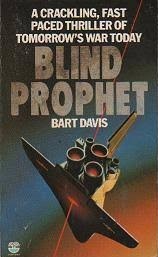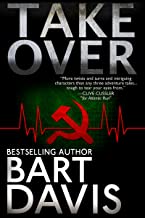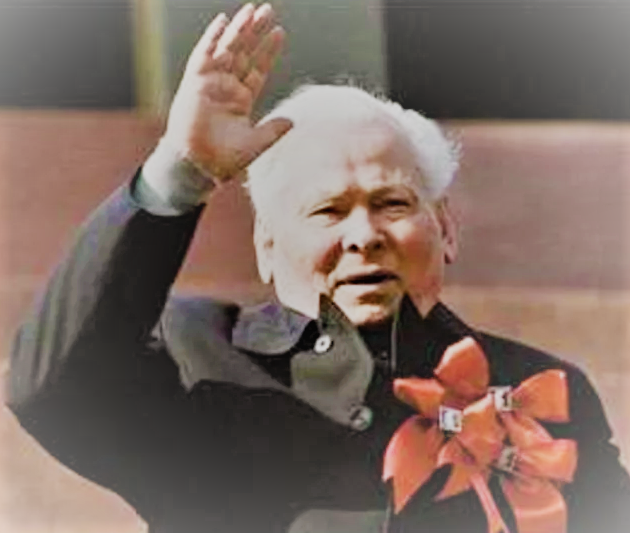
There is something fascinating about Soviet-related thrillers published in the 1980s, because we know the real life geopolitical plot outcome. That is, Mikhail Gorbachev came to power in 1985 and the Soviet Union collapsed in 1991. You cannot help but ‘read back’ into novels of that era, what we know to be the eventual outcome.
Blind Prophet is one of those novels that took me back to what got me into Russia in fiction in the first place. By the final pages I was speed-reading, not from boredom, but from the page-turning momentum of a terrifically plotted Cold War thriller, with all the key ingredients and more.
There is a mole high up in the US administration —the plot swiftly narrows this down to three people
‘a tight group … Their trust and faith in one another was obvious. He wondered what it would do to the remaining two when they discovered that one of them was a traitor …’
blind prophet, pp. 249-250
Blind Prophet was published in 1984, the same year as the more famous Tom Clancy novel The Hunt for Red October. They have a fair bit in common. Both are first novels. Both imagine a military scenario that would bring the two superpowers close to nuclear conflict and World War Three. Both are well researched, in terms of politics and military technology.
Given a step-up by President Ronald Reagan’s endorsement, Tom Clancy went on to thriller-writer megastardom. Bart Davis’s subsequent thrillers —including the 5-novel Captain Peter Mackenzie submarine-based series— touch on Soviet themes occasionally. Davis later moved away from the thriller genre, ghostwriting Black and White (2014), the autobiography of Richard ‘father of Venus and Serena’ Williams. Most recently he has co-written a series of children’s books with Julian ‘son of John’ Lennon.


Blind Prophet is very much of its time plot-wise. The Soviet Union, and the rest of the Communist Bloc, are well portrayed as in a state of economic decline, with shortages leading to civil unrest, notably in Poland.
The steadily unfolding grand plot, complete with ‘countdown clock’ scenario, is balanced with fast-moving action scenes of violence, sex, and intrigue. The standard espionage tropes are there, from dead drops to multi-car box trails. Amongst the array of military and political characters on both sides, Davis draws his central heroes and villains well.
There are scenes in the Kremlin and in the White House, as well as in other US and Soviet locations and —one of my favourite thriller locations, partly for reasons of personal knowledge— in Rome.
Blind Prophet is also that rarest of Russia-in-fiction rarities, one of the few novels to be explicitly set in the brief time when Konstantin Chernenko was leader of the Soviet Union (April 1984-March 1985).

From the ‘how is Russia portrayed?’ perspective, Davis writes an insightful description of a Soviet spy —a dedicated Communist— returning to mid-1980s Moscow from abroad.
He had ordered the driver to take a roundabout route savouring the pleasure of returning home. But soon that pleasure changed into contempt as scene after scene of corruption and criminality flashed before his hawkish eyes …
It was happening more and more, he reflected ominously, as food shortages grew more dire and consumer goods disappeared from stores, impossible for all but the privileged few to obtain. The Nachalstvo, they were called. Literally, it meant the authorities. But idiomatically, ‘big shot’ would be the idea, a term of derision, of frustration.
So the secret economy flourished and grew. Factory workers stole products to trade for food and luxury items. A bottle of vodka was traded for cosmetics, watches for fabric …
Even the language had begun to reflect it as the verb kupt [sic] – to buy – was replaced by dostat – to obtain …
On Granovskovo Street, a different scene, no less appalling, lay before him. A number of chauffeur-driven Zils stood in line in the street outside the Bureau of Special Passes, a private Party store, from which men emerged in tailored suits carrying non-descript packages filled with Argentinian beef, Danish salami, and Beluga caviar.
He noted that the number plates all began with the letters MOC, indicating members and staff of the Central Committee.
Kasimov saw more limousines waiting, as they turned onto Kalinin Prospekt, in front of the Kremlin Polyclinic, a special medical facility for the Soviet leaders.
blind prophet, pp. 101-102
At the same time as the Soviet people suffer shortages, and the Party bosses take their privileges, the arms race continues, and US technological superiority becomes more and more decisive.
The focus of this novel is the arms race in space, particularly the development of satellite networks controlling communications, the emergence of the space shuttle program, the potential for laser weapons; oh, and unusually in thriller terms, the existence and scenarios for use of apocalyptic biological weapons. Throw in also, references to the brutal Soviet warfare in Afghanistan, and Blind Prophet is brilliantly of its time.
Some of the Soviet politcs detail is terrific too. The leader of the KGB and the head of the Red Army are in conversation:
‘Grain or guns,’ sighed Komarovsky, ‘the age-old dilemma. When I sit at the politburo, I sometimes think we have become nothing but bankers. Then I look across at you and know that I’m not totally alone in my idle thoughts.’
‘No, my old friend. You’re not alone. We must feed the people, and we must protect the people. It seems the time has come when we cannot do both …
‘A good communist has faith in the party,’ needled Komarovsky lightly.
‘A good party needs vodka,’ snorted Torgenev, supplying the last line to the old joke. Reminded of his empty glass, he crossed the spartan office to the drinks cupboard under the pictures of Lenin and Chernenko.
blind prophet, pp. 29-30
There is even a minor role for the Agriculture Minister, given the name Mikhail Gorbach. At that time the real Soviet Agriculture Minister was a figure little-known in the West —to be fair, little known even in the USSR— a certain Mikhail Gorbachev.
Talking of good Soviet detail, as the novel races towards its dénouement, an important element of the plot is that ‘it never rains in Baikonur’ (p. 240); a reference to the Soviet space launch site in Kazakhstan.
Some of the sex scenes are pretty explicit, and some of the violence pretty gory, but neither particularly outside the bounds of the genre. When it comes to Soviet-era thrillers, Bart Davis’s Blind Prophet is a hidden gem. Though this novel, and most of his thriller back-catalogue, are less hidden today than for a couple of decades, having been published as e-books a few years ago.